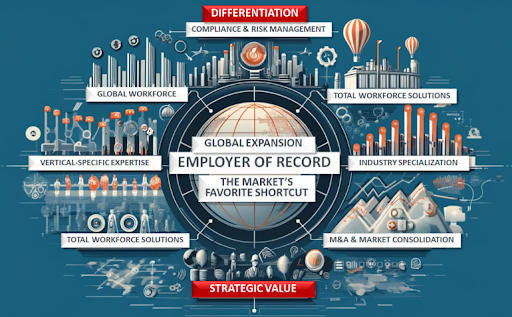Employer of Record: The Market’s Favorite Shortcut to Global Expansion
 The Employer of Record (EOR) market has evolved from an obscure niche into a critical tool for companies expanding across borders. Once a scrappy workaround for compliance-heavy hiring, EOR services now power global workforce strategies for both Fortune 500 giants and lean startups alike.
The Employer of Record (EOR) market has evolved from an obscure niche into a critical tool for companies expanding across borders. Once a scrappy workaround for compliance-heavy hiring, EOR services now power global workforce strategies for both Fortune 500 giants and lean startups alike.
But as money pours in and the sector consolidates, cracks are beginning to show. The big question: Is EOR a long-term growth engine or just a legal house of cards waiting for regulatory pushback?
Where We Stand: EOR as the “Easy Button” for Globalization
The demand for EOR services has exploded post-pandemic. Remote work, the war for talent, and the complexity of hiring in multiple jurisdictions have made compliance a nightmare. Companies don’t want to deal with foreign labor laws, tax codes, or social security contributions—they want an instant “plug-and-play” workforce solution.
Instead of setting up legal entities country by country, firms now outsource employment to EOR providers, who act as the official employer while the client controls daily operations. It’s fast, flexible, and (for now) legally sound.
This shortcut to international hiring has created a $10+ billion industry, with players like Deel, Remote, and Rippling racing to dominate. But like any hot market, EOR is now drowning in competition—and not all of them will survive the coming storm.
The Next Phase: Survival of the Differentiated
With dozens of EOR providers offering the same service, the market is reaching a saturation point. A price war has begun, and many firms are undercutting each other to win contracts—a classic sign of a market entering its shakeout phase.
The big challenge? EOR alone isn’t enough anymore. Companies now expect additional value beyond basic employment services.
Here’s where the differentiation battles are playing out:
- Compliance & Risk Management: With governments increasingly scrutinizing EOR models, firms that proactively manage legal risk (rather than just react to it) will come out on top. Expect a shift from “fast and easy” hiring to compliance-first solutions.
- Vertical-Specific Expertise: Some EORs are pivoting to industry specialization, offering tailored solutions for fintech, healthcare, and highly regulated sectors. Standard EOR services won’t cut it in fields with extra compliance layers.
- Total Workforce Solutions: The new wave of EORs is bundling in payroll automation, HR analytics, and AI-driven workforce planning—creating a full-stack employment solution rather than just a compliance fix.
- M&A and Market Consolidation: With private equity money flooding in, we’re already seeing a wave of mergers and acquisitions. The winners will be those that scale globally without losing local expertise. The losers? Small EORs unable to keep up with compliance shifts or price pressures.
The Legal Reckoning: Will Regulators Kill the EOR Model?
The biggest unknown in the EOR market isn’t competition—it’s regulation. Governments are tightening their grip on employment classification, and EORs are walking a legal tightrope.
- The EU is already cracking down on “faux employment” arrangements, questioning whether EOR truly provides substantive employment rights or if it’s just a legal loophole.
- Countries like China and India have strict employment laws that don’t easily accommodate third-party employment structures.
- The U.S. is seeing growing scrutiny over whether EOR workers are truly employees of the provider or should be classified differently.
If regulations shift, many EOR business models could be disrupted overnight. The survivors will be those who invest in compliance, build direct local entities, and adapt to changing laws before governments force their hands.
What’s Next?
The EOR market is at an inflection point. The “gold rush” phase is over. The winners will be those who evolve beyond basic employment services, navigate the legal minefield, and create real value beyond compliance outsourcing.
For companies looking to expand internationally, EOR will remain a powerful tool—but not without risks. Those relying too heavily on EOR should prepare for legal shifts and consider hybrid models (e.g., setting up direct entities in key markets while using EOR for edge cases).
The future of global work isn’t just about hiring fast—it’s about hiring right. And the EOR players who get that will be the ones left standing when the dust settles.
Go To’s: Here are the key “Go To’s” after reading the article for EOR Suppliers:
- Differentiate beyond basic compliance—offer risk management, industry-specific expertise, or full HR solutions.
- Prepare for regulatory changes by strengthening legal frameworks and compliance strategies.
- Scale smartly through M&A or strategic partnerships.
- Shift pricing models to emphasize value, not just cost-cutting.
Last but not Least: If you’re facing challenges and wondering how others are managing similar issues, why not join The Leadership Collective Community? It’s a peer group and webcast platform designed for leaders to exchange insights and experiences.
Introducing the IEC Knowledge Network Free Membership – Your Gateway to Seamless Access!
We are thrilled to present a new service that goes beyond the ordinary download experience. In addition to offering you the ability to download the things you love, we are delighted to introduce the IEC Knowledge Network Free Membership.
The Free Membership option grants you access to our library of articles and videos, without the need for tedious registrations for each piece of content.
The publication serves as a trusted resource to support executives in their pursuit of sustainable and successful global expansion. In addition the IEC Practitioners are available to discuss your specific challenge in more detail and to give you clear advise..
Take advantage of this valuable resource to accelerate your global expansion journey


